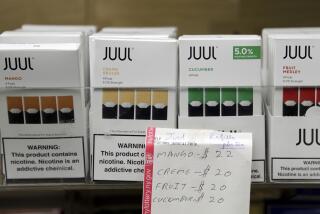Drop in Sales of Tobacco at Issue
- Share via
U.S. cigarette sales last year fell to their lowest level since 1951, but this should not jeopardize the $206-billion settlement states reached with big tobacco companies, Iowa’s attorney general said Wednesday.
Under the 1998 accord that aimed to make the companies reimburse states for the billions of dollars they spend treating ailing smokers, cigarette makers can cut their payments to states if their market share falls more than 2% a year.
Some companies want to withhold $1.2 billion of the $6.5 billion they owe the states April 15, said Tom Miller, Iowa’s attorney general.
“But we believe we have a very good story to tell,” and the states would probably win in court, he said.
The tobacco settlement obliges states to collect escrow payments from companies that did not sign the accord, Iowa’s attorney general said. Cigarette makers can win in court only if they prove the states failed to do this, he said.
Non-signing companies, often discounters, grabbed 8 percentage points of market share from 1997, the year before the pact was sealed, to 2003, according to a tobacco company official who requested anonymity. Signing firms in 2003 sold about 91% of all cigarettes in the U.S.
This year’s April 15 payment to the states is for 2003.
The next decision in the battle will be made by an arbitrator, who has preliminarily held that big tobacco companies did lose more than 2% of its market share in 2003. By March 27, the arbitrator should rule whether the settlement caused that drop in market share, Miller said.
Most of the states say that if they lose this round, they would take the cigarette makers to court, he said.
Miller and other attorneys general said a sharp drop in cigarette sales last year is one of the pact’s biggest successes.
Sales were 378 billion in 2005, a 4.2% drop from the year before. On a per capita basis, the number of smokers has fallen even further -- to levels last seen in the late 1930s -- partly because the settlement drove up prices, the attorneys general said.
More to Read
Sign up for Essential California
The most important California stories and recommendations in your inbox every morning.
You may occasionally receive promotional content from the Los Angeles Times.










